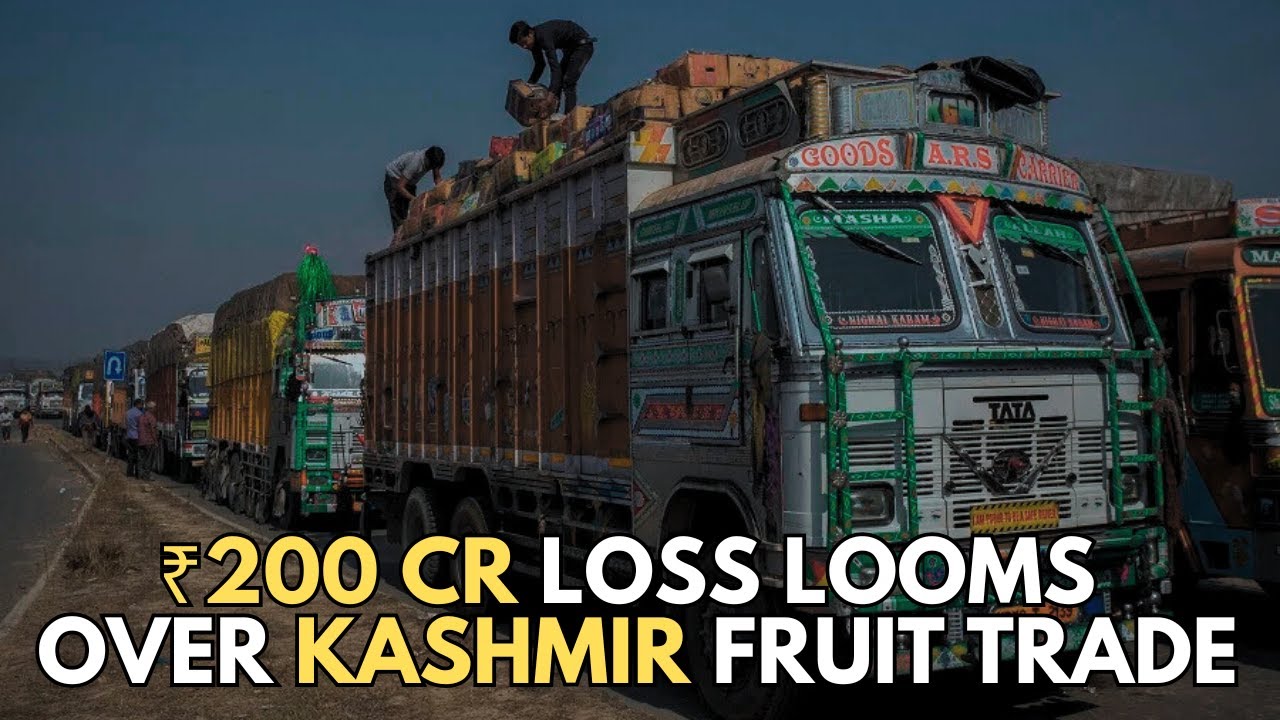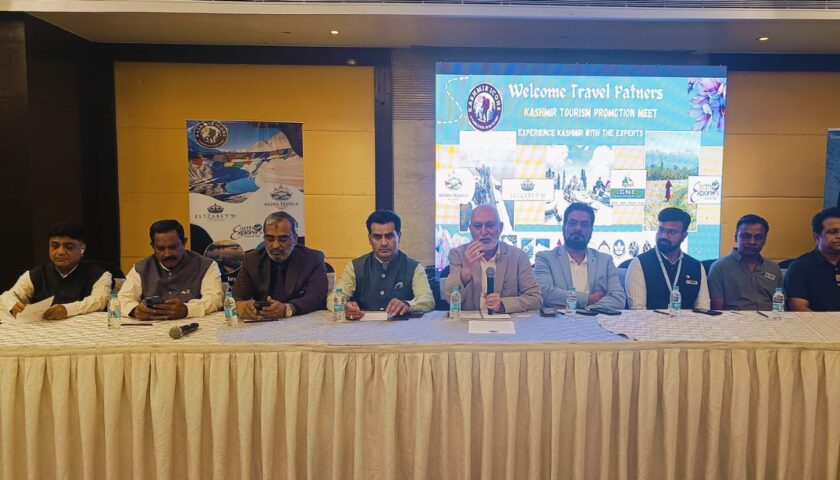Kashmir’s Economy on the Edge: Highway Closure Leaves Apple Growers Facing Crores in Losses
By: Javid Amin | 04 Sep 2025
A Valley Cut Off
Kashmir is no stranger to hardship, but the latest crisis hitting the Valley has struck right at the heart of its economy. The closure of the Srinagar–Jammu National Highway, the region’s economic lifeline, has paralyzed trade and left truckloads of perishable fruit rotting on the roadside.
With losses now estimated to exceed ₹200 crore, farmers, traders, and transporters find themselves grappling with a situation that is as much structural as it is seasonal. For a region where horticulture sustains seven lakh families and contributes ₹20,000 crore annually, this disruption feels like an emergency with long-term consequences.
What’s Happening on the Ground
The Highway Closure
Since late August, relentless rains, flash floods, and landslides have repeatedly cut off the Srinagar–Jammu Highway (NH-44). This single artery, stretching over 270 km, connects Kashmir’s markets with the rest of India. When it shuts, the Valley is effectively sealed off from its largest buyers.
-
Over 800 fruit-laden trucks remain stranded near Qazigund.
-
Many carry Bagogosha pears and Gala apples, fruits with extremely short shelf lives.
-
Truckers, many of whom invested borrowed money into transporting this season’s produce, are left stranded for days in makeshift camps without adequate food or fuel.
Sopore Fruit Mandi at a Standstill
The Sopore Fruit Mandi—Asia’s second-largest fruit market—usually dispatches 100–150 truckloads daily during peak harvest. This season, trade has slowed to a trickle.
Only a handful of six-tyre trucks have been permitted to move via the Mughal Road, but the narrow, hilly terrain makes it unsuitable for large-scale fruit transport.
The mandi, once a bustling hub of negotiation and commerce, now lies eerily silent. Farmers, traders, and laborers who depend on the mandi’s daily rhythm find themselves idle, their faces etched with anxiety.
The Economic Fallout: Crores Lost in Days
The numbers tell a grim story.
-
Prices Crash: American apple boxes that fetched ₹600 just weeks ago are now reduced to ₹400–₹450.
-
Spoilage Losses: A truckload valued at ₹15 lakh is now recovering barely ₹1–2 lakh due to rot.
-
Direct Losses: Horticulture bodies estimate that nearly ₹200 crore worth of fruit has been lost in under a week.
For farmers, this is catastrophic. They invest for months—fertilizers, pesticides, labor, irrigation—only to see their produce perish before reaching markets. The losses ripple outward:
-
Traders delay payments to farmers.
-
Laborers hired for harvesting lose work.
-
Transporters default on fuel or loan repayments.
It is not just fruit that is lost—it is an entire season’s income, and in some cases, a family’s survival.
A Structural Problem, Not Just Bad Weather
Kashmir’s fruit crisis is being presented as a temporary disruption, but growers and experts insist that it reflects systemic vulnerabilities.
1. Overdependence on One Highway
The Srinagar–Jammu Highway is Kashmir’s only reliable link to the outside world. Every closure—whether from landslides, accidents, or snowfall—cripples trade. This dependency makes the economy extremely fragile.
2. Mughal Road: Inadequate Alternative
Authorities allowed limited clearance of six-tyre trucks via the Mughal Road, but it is too narrow, winding, and weather-prone to support the Valley’s massive fruit trade.
3. Cold Storage Gaps
Controlled Atmosphere (CA) storage could have saved much of the produce. However, access is limited:
-
Only a few large growers or traders own or rent storage.
-
Small farmers, who form the majority, cannot afford it.
-
Even existing CA facilities are inadequate for the Valley’s output.
4. Climate Change Factor
Erratic weather—long dry spells followed by torrential rains—has become more frequent. Scientists warn that climate change is intensifying rainfall patterns, making landslides and flash floods more likely.
Thus, the crisis is not just about one bad season. It is about the infrastructure, policies, and climate vulnerabilities that repeatedly put Kashmir’s economy at risk.
Farmers’ and Traders’ Demands
In the face of mounting losses, growers and traders are issuing urgent appeals. Their demands include:
-
Immediate clearance of stranded trucks and restoration of highway connectivity.
-
Rail-based freight corridor from Srinagar to Delhi, to bypass vulnerable road stretches.
-
Government compensation for spoiled fruit and transport delays.
-
Expansion of affordable cold storage facilities accessible to small growers.
-
Crop and logistics insurance to safeguard against future losses.
As one grower from Shopian put it:
“We can survive a bad harvest. But how can we survive when our harvest never even reaches the market?”
Case Studies: Voices from the Valley
Abdul Rashid, Shopian Farmer
Abdul Rashid’s family has grown Bagogosha pears for three generations. This year, his truck carrying ₹10 lakh worth of pears was stranded near Banihal for four days. By the time it moved, half the fruit had rotted. He recovered ₹1.5 lakh.
“I had borrowed money for fertilizers. Now I cannot repay the loan. Who will answer for this?”
Shabnam & Co., Sopore Trader
A Sopore trader invested in three truckloads of American apples, valued at nearly ₹45 lakh. Two trucks never reached Delhi on time. He estimates losses of ₹30 lakh.
“This is not business. This is gambling with nature and roads.”
Nazir Ahmed, Truck Driver
Nazir was stranded at Qazigund for six days. He slept in his truck cabin, relying on tea stalls for food. His vehicle carried pears worth ₹12 lakh. By the time he moved, half the load was spoiled. He fears he will not be paid in full.
“We truckers suffer quietly. Farmers blame us. Traders blame us. But the road is not in our hands.”
Expert Analysis: Why This Matters Beyond Kashmir
Economists caution that Kashmir’s fruit crisis has national implications.
-
Food Security: Kashmir supplies 70% of India’s apples. Shortages can affect prices across the country.
-
Employment: Horticulture supports over 3 million people directly and indirectly. Losses risk widespread unemployment.
-
Regional Stability: Prolonged economic distress in a conflict-prone region can fuel discontent and migration.
-
Climate Change Adaptation: Without urgent infrastructure reforms, such crises will repeat with greater frequency.
Roadmap for Resilience: What Needs to Change
Experts and farmer unions suggest a mix of short-term relief and long-term reform:
1. All-Weather Transport Infrastructure
-
Fast-track completion of alternate tunnels and bypasses on NH-44.
-
Develop a dedicated freight rail line from Srinagar to Delhi.
2. Cold Storage Expansion
-
Subsidize Controlled Atmosphere (CA) storage units for small growers.
-
Create community-level cooperatives for storage and collective marketing.
3. Crop & Transport Insurance
-
Introduce insurance schemes covering both crop failure and logistics losses.
-
Government-backed payouts to cover at least partial costs of spoiled produce.
4. Climate-Adaptive Agriculture
-
Diversify orchards to include climate-resilient varieties.
-
Promote soil conservation and rainwater harvesting in orchards.
5. Digital Integration
-
Strengthen online farmer-to-market trade platforms.
-
Enable growers to sell directly to Delhi, Mumbai, and Bengaluru wholesalers via e-auctions.
Comparative Lens: Lessons from Elsewhere
-
Himachal Pradesh also grows apples but has a more resilient road + rail mix for transport.
-
European fruit markets (like Italy’s apple hubs) rely heavily on cold storage + freight corridors, ensuring minimal spoilage.
-
Kashmir can learn from these models, adapting them to its unique geography.
Bottom-Line: From Rot to Resilience
The highway closure of 2024 is not just a logistical hiccup. It is a wake-up call. Kashmir’s fruit economy—worth thousands of crores and sustaining lakhs of families—cannot remain hostage to one fragile road.
If immediate interventions are not made, the Valley’s farmers will continue facing “unlimited loss.” But with better transport, storage, and policy planning, Kashmir can not only survive but thrive, ensuring that the apples that bloom in its orchards actually reach the tables of India.
The orchards are ready. The farmers are willing. What Kashmir needs is a system that does not let its harvest rot on the roadside.




